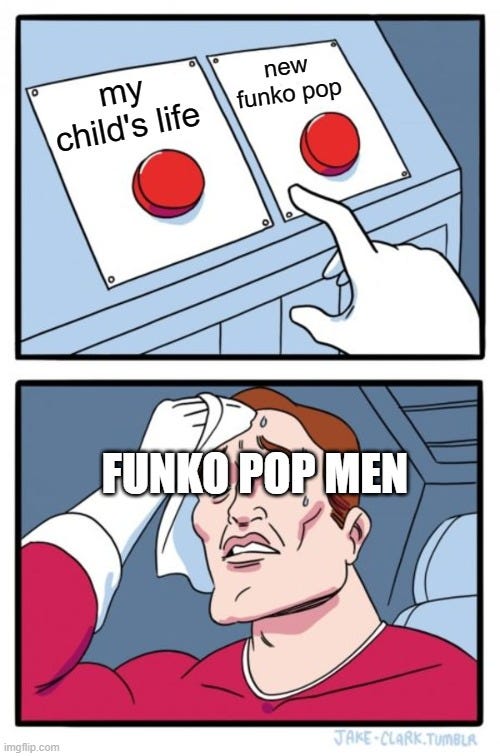welcome to guyville
new type of guy who explains guys just dropped
I keep thinking about this tweet, which I think I put in a BNet but, regardless,
We’re currently living in a Guy Renaissance. Every day, it seems we’re learning about new types of guys. Guys who love their curvy wife, guys who film their wife falling down a cliff, sword guys, e-boys, “what?” guys, Bitcoin guys, Bean Dads, gamers, “sunglasses selfie in a car” guys, simps, reply guys, and uh, whatever this is.
There are all kinds of guys, and I’m interested in the impulse to label someone a “guy.” First, we need to step back a bit. There’s a concept on Twitter known as “being the main character,” which comes from a tweet by user @maplecocaine about the people who get clowned on — “Each day on twitter there is one main character. The goal is to never be it” — and if you reach further back, from the concept of solipsism. I touched on this briefly last week but, briefly, Twitter rewards users who talk about what other users are talking about. So if someone has embarrassed themselves on Twitter, the platform rewards everyone who weighs in on what said person is doing. Some of this is a natural network effect, but a lot of it is algorithmic boosting.
At the same time, there is the concept of a new [x] dropping. “New [x] just dropped,” is what people say. It’s a joke, you see, that derives effect from understatement.




You get it. It’s a pretty good snowclone, easy to implement, not overbearing. A simple meme. As you can see, a lot of the new things that drop are scientific discoveries, which lends a sort of rigor to the proceedings. When a new guy drops, they are not invented out of thin air, but rather, they are discovered by someone who is not that type of guy. This means that everyone is now always on the lookout for new types of guys, eager to make their mark as the first to classify the new guy.
The existence of “new guy” culture also reflects an implicit understanding about the internet, one that people seem to instinctively grok even if they aren’t fully conscience of the fact. It is interesting to me that “new guy” discourse has evolved from a singular “main character” into a “type of guy” encompassing multiple individuals. What this indicates is that people understand that nobody is fully individual on the internet. This is the power and allure of the internet! No matter how weird your interests are, or how niche your fetish, the odds of being able to find a cohort online are never zero.
This is also why people like me like exploring it, and why internet culture reporting requires a keen eye. It is extremely easy to find a half dozen people who agree on something, but is that really a type of guy? For instance, this past week I saw a lot of people saying that sea shanties are popular online. However, I could only find one viral video of guys singing one shanty that everyone was referencing. It was fun and it sounded great… but did it prove that sea shanties are popular online among a certain community? Or did it show that a lot of people enjoyed one video of guys singing shanties?
What separates a viral object (an individual piece of media with a large audience) from a meme (a trend with many participants)? What separates Twitter’s main character (one guy) from a “new type of guy” (multiple guys)? I don’t really have an answer, it just points to a conundrum. The internet has created an infinite amount of guys both real and imagined, and the line between the two broad categories is becoming increasingly blurred.
This afternoon, I was scrolling through Tumblr and I came across an intriguing post, aggregating a number of image macros and social media posts about “Funko Pop men” who were apparently endangering their children in April of last year in order to snag rare Funkos. Here are a couple:
“Damn, I totally missed this type of guy,” I thought to myself. I know about Funko Pop guys, but I was unaware of “guy who needed Funkos so bad his kid got coronavirus.” And then I got to the end of the long collection of images, where the original poster had written, “throwback to the time I got really annoyed at the funko pop men who were coming into my store and bothering me during the pandemic so I made a bunch of memes and fake tweets.”
I’m not really annoyed that this person made up some fake posts — they’re funny. But I find the impulse illustrative of a larger phenomenon. The internet now lets us, at least partially, comprehend the scale of the world, and know that there is always a guy for any type of behavior. And so this person imagined what it would be like if the most active people on social media discovered a new type of guy and started clowning on them.
We now exist in a neverending race to discover new guys or create them out of thin air. I look forward to finding out what new guys the future will bring.
Elsewhere…
google reveals what people really want to know
tweeting about western artists like kpop stans
the three genders
here’s an old, great video from like a decade ago that i was reminded of recently
this is what yads are for
here’s someone learning about the ancient history of… y2k












